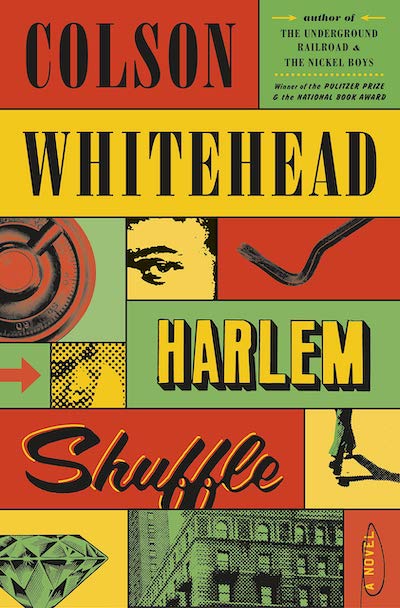Colson Whitehead: Harlem Shuffle review - period piece speaks to the present | reviews, news & interviews
Colson Whitehead: Harlem Shuffle review - period piece speaks to the present
Colson Whitehead: Harlem Shuffle review - period piece speaks to the present
The 'Underground Railroad' novelist lets his hair down with a hardboiled crime piece devoted to 60s Harlem

More than once, reading Colson Whitehead’s latest novel Harlem Shuffle, the brilliant Josh and Benny Safdie movie Uncut Gems from 2019 came to mind, which was unexpected. For one, Whitehead’s book takes place on the other side of Central Park, far uptown from the film’s downtown Diamond District setting.
Our hero Ray Carney has that balancing act down to a pretty fine art, or would do, if it weren’t for his cousin Freddie. Practically brought up together and both sons of negligent fathers, the two men have ended up on very different if occasionally crossing paths. Carney is ever on the up, running a furniture store whose respectable takings he supplements with a sideline business in pawning off jewellery, most of which he gets from Freddie. (He doesn’t ask too many questions about where Freddie gets it from.) This quiet racket allows him to save up for a new apartment in a better area with his wife Elizabeth, who’s used to more comfortable surroundings (as his in-laws never let him forget), and their growing family. But the money flow also helps to keep Freddie afloat: he always seems in danger of going overboard – on weeklong benders – then under. And of taking Carney down with him. Over the years Carney has heard Freddie’s go-to apology, “I didn’t mean to get you in trouble”, a few too many times.
 As the book opens, Freddie has got himself and his cousin into some potentially very big trouble, roping Ray in as the man to handle the stolen goods from a heist at the Hotel Theresa, former epicentre of African American glitz and glamour, that goes a little awry and rubs a local kingpin up the wrong way. The fallout is like a rising tide of sewage Carney constantly has to keep at bay, from swallowing up his livelihood or from taking his cousin’s life. To do so means dipping into a murky world of corrupt cops and trigger happy pimps and power hungry peddlers – a world Carney has always had at least a couple of toes in whether he likes it or not. He is his father’s son, as people keep reminding him, and that struggle to keep his bad side from mixing with the good becomes almost literal as he reverts to the centuries’ old pattern of “dorvay” or segmented sleep – two periods of sleep with midnight hours of activity (in this case, criminal) in between.
As the book opens, Freddie has got himself and his cousin into some potentially very big trouble, roping Ray in as the man to handle the stolen goods from a heist at the Hotel Theresa, former epicentre of African American glitz and glamour, that goes a little awry and rubs a local kingpin up the wrong way. The fallout is like a rising tide of sewage Carney constantly has to keep at bay, from swallowing up his livelihood or from taking his cousin’s life. To do so means dipping into a murky world of corrupt cops and trigger happy pimps and power hungry peddlers – a world Carney has always had at least a couple of toes in whether he likes it or not. He is his father’s son, as people keep reminding him, and that struggle to keep his bad side from mixing with the good becomes almost literal as he reverts to the centuries’ old pattern of “dorvay” or segmented sleep – two periods of sleep with midnight hours of activity (in this case, criminal) in between.
As a crime caper (with a revenge plot thrown in) Harlem Shuffle is masterfully crafted; you can’t always tell where it’s going to go. Those moments when you can – when a scene or chapter wraps up a little too neatly, where a wisecrack is a little too wise – are few and far between and at the very least show the two-time Pulitzer Prize-winner allowing himself to have a little fun. The heist itself is an flawless setpiece and, although it gets off to a slow start, the book as a whole rattles along like an El train fuelled by street talk and shop floor patter. Just like the masters of the hard-boiled novels he’s clearly been reading, Whitehead is a great riffer and one who can play by ear. He sticks closely to Carney but he also easily slips into other people’s skins and speech. It feels as though all the characters, no matter how tangential to the plot, are given their narrative due; all the lost souls and nightowls seen or heard.
But what really sets Harlem Shuffle out from the crowded market of genre fiction and marks it out as distinctly Whiteheadian (has he earned his own adjective?) is its sense of the larger structures its characters shift in, or else are stuck in. None of characters is actively or expressly political, with perhaps the exception of Carney’s lawyer friend who is making a name for himself working on high-profile civil rights cases – and even then he is as preoccupied with making a name for himself as fighting those battles. For the most part, the major anxieties and events of the book’s 1959-1964 timeline – the threat of nuclear war, the rise of heroin addiction, the civil rights movement – are glimpsed on the periphery, only fleetingly coming into focus, and they feel all the more lived in because of that. One of the riots that rocked Harlem in the wake of the shooting of James Powell serves as backdrop and local colour to Freddie’s search for a good sandwich. Complaints about opioid addicts and looting and the inadequate justice system edge into conversation but take a backseat to self-preservation and everyday survival. And it is remarkable too to see how little those conversations have changed. The particulars, yes, but not the problems. All of which makes Harlem Shuffle a slightly uncanny reading experience. In many ways, the 1960s could be the 2010s. In the end, it’s all fire and ferment. The times they are a-changin’, but the more things change...
- Harlem Shuffle by Colson Whitehead (Hachette, £16.99)
- More book reviews on theartsdesk
The future of Arts Journalism
You can stop theartsdesk.com closing!
We urgently need financing to survive. Our fundraising drive has thus far raised £49,000 but we need to reach £100,000 or we will be forced to close. Please contribute here: https://gofund.me/c3f6033d
And if you can forward this information to anyone who might assist, we’d be grateful.

Subscribe to theartsdesk.com
Thank you for continuing to read our work on theartsdesk.com. For unlimited access to every article in its entirety, including our archive of more than 15,000 pieces, we're asking for £5 per month or £40 per year. We feel it's a very good deal, and hope you do too.
To take a subscription now simply click here.
And if you're looking for that extra gift for a friend or family member, why not treat them to a theartsdesk.com gift subscription?
more Books
 'We are bowled over!' Thank you for your messages of love and support
Much-appreciated words of commendation from readers and the cultural community
'We are bowled over!' Thank you for your messages of love and support
Much-appreciated words of commendation from readers and the cultural community
 Justin Lewis: Into the Groove review - fun and fact-filled trip through Eighties pop
Month by month journey through a decade gives insights into ordinary people’s lives
Justin Lewis: Into the Groove review - fun and fact-filled trip through Eighties pop
Month by month journey through a decade gives insights into ordinary people’s lives
 Joanna Pocock: Greyhound review - on the road again
A writer retraces her steps to furrow a deeper path through modern America
Joanna Pocock: Greyhound review - on the road again
A writer retraces her steps to furrow a deeper path through modern America
 Mark Hussey: Mrs Dalloway - Biography of a Novel review - echoes across crises
On the centenary of the work's publication an insightful book shows its prescience
Mark Hussey: Mrs Dalloway - Biography of a Novel review - echoes across crises
On the centenary of the work's publication an insightful book shows its prescience
 Frances Wilson: Electric Spark - The Enigma of Muriel Spark review - the matter of fact
Frances Wilson employs her full artistic power to keep pace with Spark’s fantastic and fugitive life
Frances Wilson: Electric Spark - The Enigma of Muriel Spark review - the matter of fact
Frances Wilson employs her full artistic power to keep pace with Spark’s fantastic and fugitive life
 Elizabeth Alker: Everything We Do is Music review - Prokofiev goes pop
A compelling journey into a surprising musical kinship
Elizabeth Alker: Everything We Do is Music review - Prokofiev goes pop
A compelling journey into a surprising musical kinship
 Natalia Ginzburg: The City and the House review - a dying art
Dick Davis renders this analogue love-letter in polyphonic English
Natalia Ginzburg: The City and the House review - a dying art
Dick Davis renders this analogue love-letter in polyphonic English
 Tom Raworth: Cancer review - truthfulness
A 'lost' book reconfirms Raworth’s legacy as one of the great lyric poets
Tom Raworth: Cancer review - truthfulness
A 'lost' book reconfirms Raworth’s legacy as one of the great lyric poets
 Ian Leslie: John and Paul - A Love Story in Songs review - help!
Ian Leslie loses himself in amateur psychology, and fatally misreads The Beatles
Ian Leslie: John and Paul - A Love Story in Songs review - help!
Ian Leslie loses himself in amateur psychology, and fatally misreads The Beatles
 Samuel Arbesman: The Magic of Code review - the spark ages
A wide-eyed take on our digital world can’t quite dispel the dangers
Samuel Arbesman: The Magic of Code review - the spark ages
A wide-eyed take on our digital world can’t quite dispel the dangers
 Zsuzsanna Gahse: Mountainish review - seeking refuge
Notes on danger and dialogue in the shadow of the Swiss Alps
Zsuzsanna Gahse: Mountainish review - seeking refuge
Notes on danger and dialogue in the shadow of the Swiss Alps
 Patrick McGilligan: Woody Allen - A Travesty of a Mockery of a Sham review - New York stories
Fair-minded Woody Allen biography covers all bases
Patrick McGilligan: Woody Allen - A Travesty of a Mockery of a Sham review - New York stories
Fair-minded Woody Allen biography covers all bases

Add comment